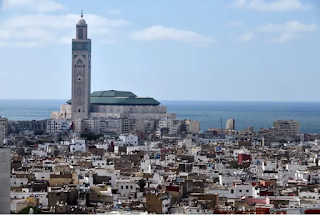The Moroccan authorities called on Amnesty International to provide material evidence to prove their accusations of Rabat using the “Pegasus” spyware program to hack the phones of journalists and activists.
On Friday, Morocco called on Amnesty International to provide evidence and arguments for its "arbitrary allegations" about Rabat's use of spyware to hack the phones of journalists and activists.
This came in a statement published by the official Moroccan news agency MAP, in response to Amnesty's accusation of Rabat of spying, through the Israeli "Pegasus" program, on journalist Omar Radi.
On February 28, 2022, the Moroccan authorities sent a letter to the organization, renewing its demands regarding the evidence and material arguments for its allegations. "In response to Amnesty International, which issued a statement on March 9, 2022, continuing to promote its arbitrary allegations of Morocco's possession and abuse of the Pegasus programme, targeting civil society activists," the statement said.
And he added, "On June 26, 2020, the Executive Director of Amnesty Morocco, Mohamed Sektaoui, was informed of the Moroccan authorities' astonishment regarding the organization's allegations and their reluctance to provide material evidence to substantiate their allegations, and the authorities' renewal of their demands to provide them with all the evidence for these allegations."
He stressed that "this organization (Amnesty) is again unable, as usual, to present a clear argument and proven physical evidence," as "it (its report) did not provide material evidence that proves Morocco's alleged relationship to hacking the phones of some people."
Morocco had previously sued international organizations and foreign media institutions last June, on charges of defamation, on the grounds that they accused Rabat of spying on the phones of public and foreign figures, using the “Pegasus” program, which the Moroccan authorities have repeatedly denied.
On July 19, the Moroccan judiciary issued a 6-year prison sentence against journalist Omar Radi, who was arrested in late July 2020 and followed up on charges of "rape" and "espionage". Which the journalist strongly denies.
Rwanda bans the call to prayer over loudspeakers at specific times, What is the reason?
The Muslim community in Rwanda has announced that the government has banned the call to prayer via loudspeakers at the dawn, sunset and evening prayers. For his part, the head of local administrations explained that the law was misunderstood, and that it was not an abolition of worship, but rather was taken within the framework of the Environmental Law, which witnessed amendments in 2018.
The government in Rwanda sent a notice to mosques to implement the ban on the call to prayer over loudspeakers at specific times as part of a 2018 legal amendment.
And the Muslim community in Rwanda announced that the government banned the call to prayer via loudspeakers at the dawn, sunset and evening prayers, starting from 17 March.
The head of local administrations in Rwanda, Gatabaze Jane Maria Vyani, said in a press statement, Friday, that the decision regarding the call to prayer is not new, but was taken within the framework of the environment law, which witnessed amendments in 2018.
He said, "The truth is that the law that was passed was not implemented, the directives were not followed, and at the request of residents who expressed their alarm, we decided to enforce the law categorically."
He stressed that the law was misunderstood, and that it was not an abolition of worship, adding: "Muslims can practice their worship freely, and the goal of the decision is to suspend noise activities that occur between 4 pm and 6 am throughout Rwanda."
In 2018, Rwanda made a legal amendment, banning any noise after a specified hour in bars, restaurants and religious places in the capital, Kigali.
Malawi launches massive polio vaccination campaign
Africa had defeated polio in 2020, but a case broke out in February in Lilongwe, Malawi. To curb its spread, four mass vaccination campaigns are planned, the very first will start on March 20, more than 2 million children under 5 are affected by this vaccination.
In February, a four-year-old girl living in the capital city of Lilongwe was diagnosed with type 1 polio. This is the first case of polio in Malawi in three decades and the first case on the continent since it was was declared free of wild poliomyelitis in 2020.
Malawi has secured 6.8 million doses of oral polio vaccine which will be administered to children under five in the country's 29 districts. We are therefore talking about 2.5 million children under the age of 5 who will receive this vaccine and our objective is to reach every child. We will not leave any child unvaccinated and this is the way forward if we are to interrupt the transmission of the wild polio virus explained Dr Susan Kambale, head of early childhood at the World Health Organization in Malawi.
The oral polio vaccine targets two strains of the virus, the one detected in Malawi and Pakistan. It will be administered in all health establishments as well as in local clinics.
People go to church, to mosque, children go to school so even the children, even in primary school, if they can receive this information about polio, they can even be the big advocates in their families by encouraging their parents to get the children vaccinated so that they are protected from polio and these days social media has a lot of coverage so a way to spread the message through social media she adds.
Four neighboring countries in East Africa will join the mass vaccination campaign: Zambia, Mozambique and Tanzania initially, then Zimbabwe in a second phase, in May and June.





